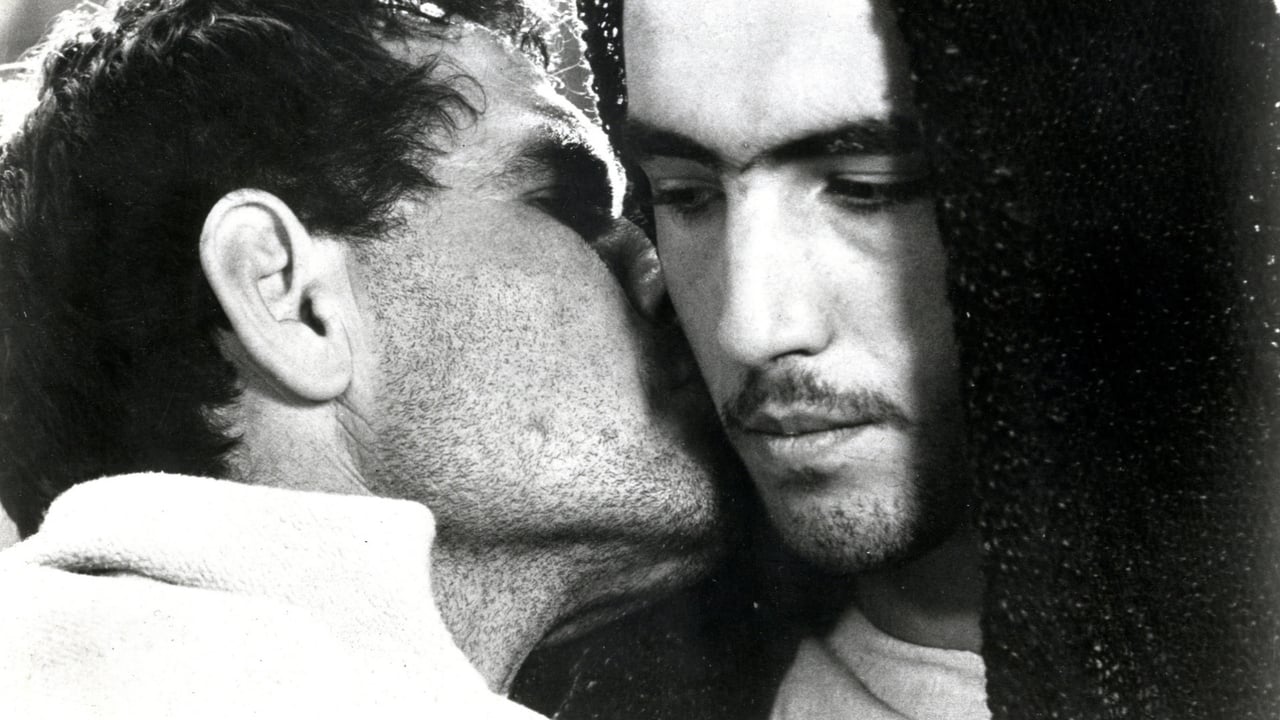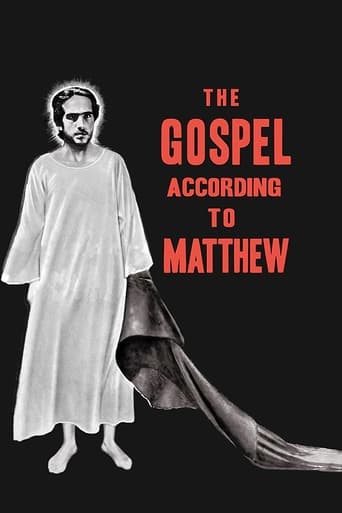CrawlerChunky
In truth, there is barely enough story here to make a film.
HottWwjdIam
There is just so much movie here. For some it may be too much. But in the same secretly sarcastic way most telemarketers say the phrase, the title of this one is particularly apt.
Kinley
This movie feels like it was made purely to piss off people who want good shows
Dario Vaccaro
The Gospels are to me some of the dumbest stories ever told: nothing in them makes any sense, thus enforcing my belief that what they try to say is not true. But Pasolini is not a propagandist, it's actually pretty hard to call him a Christian at that: he's an artist and his portrayal of the life of Jesus is between the best ever made precisely because he's not a fanatic believer. You can actually feel respect and awe in his view of the (so called) son of God, and his neorealist style is perfect for the atmosphere of tribal magic evoked by the setting of rural southern Italy, where the movie was filmed. As in most neorealist films, though, the lack of experienced actors and the lavish use of dubbing results in overall clumsy performances, except that of the main character, excellently portrayed by both the -non professional- actor and the -professional- dubber. Technically, the film is strongly flawed, but none of that matters fruition-wise except for some awfully abrupt editing that makes no sense at all. Pasolini's marxist view of the world sides him in favor of the aspects in Christ's doctrine that can be assimilated to that ideology, but everything that's said in the film is taken word-by-word from the book itself, so no-one should accuse him of bias. It is an artistic, realistic and faithful account of what I consider a stupid story, that unfortunately so many people still deem relevant to this day.
Graybell
Rendering Bible stories into film is a difficult task, but Pasolini's account of Matthew's Gospel is among the most successful. The narration of events in the Bible is generally quite sparse, with only the most salient details given; as a result, events are fraught with hidden depths and profundity. Medieval art gives a similar effect, using completely different techniques. Filmmakers of the Bible generally attempt to flesh out the stories to make them more "real," but the result is inevitably banal and overwrought at the same time. Pasolini uses a different approach. First of all, he adds almost nothing to the text of Matthew's Gospel, and all the dialogue and events are directly from Matthew. Next, it's filmed in black & white, and the acting, especially Jesus, is consistently understated. Many quiet shots of faces watching, reacting, or, in the case of Jesus, talking. In these ways, Pasolini succeeds, to some degree, in reproducing the effect of depth and transcendence found in the Bible. The music (from Bach, Blind Willie Johnson, and others) adds considerably to the power of the movie.Pasolini's minimalist Jesus has an air of both humility and loftiness (as befitting one able to walk on water), but he is conspicuously lacking in emotion and expression. One might reply that Jesus (as God) doesn't share all our roller coaster emotions, but I see the New Testament Jesus as more of a Hamlet character, full of contradictory emotions. Pasolini's Jesus character's foreboding presentation could almost be seen as that of a young, conceited, dour, nihilistic Sophomore Philosophy student. A few quibbles: the Bible text describes large crowds of people following Jesus, but the movie only allows for a couple of dozen in most scenes. Also, in the movie, Jesus is often represented as preaching while he is walking, with his back turned away from his followers, who walk behind him. Finally, Mary the mother of Jesus is at most 20 when he is born, but she somehow becomes 70 years old during his ministry, when in fact she would have been only 50. With these reservations, then, I consider this the most successful Bible film I've seen.
gavin6942
Along a rocky, barren coastline, Jesus begins teaching, primarily using parables. He attracts disciples; he's stern, brusque, and demanding. He comes to bring a sword, not peace, he says. He's in a hurry, moving from place to place near the Sea of Galilee, sometimes attracting a multitude, sometimes being driven away.The director reportedly chose Matthew's Gospel over the others because he had decided that "John was too mystical, Mark too vulgar, and Luke too sentimental." An interesting analysis, and more interesting that he picked just one rather than combine them as people tend to do. Given Pasolini's well-known reputation as an atheist, a homosexual, and a Marxist, the reverential nature of his film could come as a surprise at a first approach.The film received mostly good reviews from critics, including several Christian critics. Philip French called it "a noble film," and Alexander Walker said that "it grips the historical and psychological imagination like no other religious film I have seen. And for all its apparent simplicity, it is visually rich and contains strange, disturbing hints and undertones about Christ and his mission." The Vatican allegedly said it was the best version of Jesus' life on film. How strange that a homosexual, atheist revolutionary could tell the story so well... or perhaps it is not strange at all?
theskylabadventure
The fact that this is hailed as a "masterpiece" and "one of cinema's greatest achievements" is truly astonishing. Along with Herzorg's "Heart of Glass", Pasolini's "Gospel" is one of the truly abhorrent works of world cinema. I spend my life defending "art-house" cinema against its detractors who claim that it's pretentious and self-indulgent. This is truly one of those films which gives all of world cinema / art-house cinema a bad name.Where to start...? Needless to say, one cannot really lay any blame on the screenplay. Here we have one of the most fascination, stirring, important, enduring and influential stories of all time, without which we would have no Man with No Name, no Star Wars, no Harry Potter. I can honestly say I've seen pre-school productions of the passion which moved me more than this. In fact, the most astonishing thing about this film is that it manages to make you not care about Jesus' life or death at all.The acting is staggeringly bad. The guy who plays Jesus looks the part, but he has one facial expression with which to communicate the entire range of Jesus' experience. One facial expression for the whole movie. Seriously, this guy makes Steven Seagal look like Laurence freaking Olivier. In spite of his oak-like demeanour, Pasolini's Christ manages to come off as angry and intolerant, rather than divine. He shouts, he condemns, he dictates. This is hardly surprising, given Pasolini's radially political sensibilities, but did he have to make Jesus look like a jerk just to appease his own malcontented frustrations?The actors playing the disciples, admittedly, have greater range, though not by much. Typically, their expressions range from confused to bemused. What's worse, they look like a bunch of Italian rent boys; all designer stubble and greasy hair. One of them has more wax in his hair than Elvis, which is fascinating given that the film is set 2000 years ago.This brings me to one of my biggest problems with this film; the countless anachronisms. Costume design is all over the place - no two people look like they come form the same period or region. The music used ranges from traditional Congolese songs to Negro-spirituals to European Baroque choral music. Many critics lauded this "eclectic" use of costume and music. For me, hearing Odetta singing "Motherless Child" while I'm looking a Jesus clearly in his mother's arms while she wears Byzantine-era clothing is plain stupidity. Frankly, it's also a bit of an insult to the song, which is about black children who were taken from their parents as infants to be slaves. Is Pasolini comparing the plight of the Jews to the plight of early slaves in America? Frankly, based on the evidence so far, that would be giving him way too much credit.I am also confused as to the presence of a female angel, since none are ever mentioned in the book of Matthew or any other book. This wouldn't bother me per se, were it not for the fact that, this glaring error notwithstanding, Pasolini deliberately stuck to the gospel verbatim, even going as far as to use no dialogue aside from that found in the book of Matthew. For this, the film suffers even more. I hardly think Matthew was worried about the book's validity as a screenplay when he was writing it, so this pious insistence on sticking to his words is absurd, and totally out of keep with the other "stylistic" choices the film makes, namely the rampant anachronisms.Continuity and sound-dubbing are hilariously bad; one of my favourite moments is when we see a man playing with his baby. The baby looks annoyed and grumpy, yet the image is complimented with the classic baby- giggling effect you get in diaper commercials. When Jesus is a baby, Mary is played by a girl who can't have been more than 15 years old. When Jesus is an adult - some 30ish years later - Mary is played by Pasolini's mother, who was almost 70 years old at the time. Are we supposed overlook the fact that Mary has bizarrely aged 55 years? If so, why? What is Pasolini's point in using his own mother as the mother of Christ? Surely an atheist, Marxist homosexual would have no desire to compare himself to Christ... Frankly, I don't care enough to think about it.The camera operator was clearly either drunk or a child. On at least two occasions he pans to an empty space before clumsily fumbling up or down toward the person or thing he was supposed to be filming. One has to wonder, why on earth didn't Pasolini simply do another take? Was he in a hurry? I can only deduce that he was, as the whole film is made in such a slap-dash way, it's as if he simply didn't care what ended up on the screen. And there we are again, not caring. Pasolini has managed to make me completely indifferent to what is supposed to be the most moving story ever told.Put simply, this film is an abomination. An insult to cinema and an insult to anybody who has two-braincells to rub together. Avoid!

